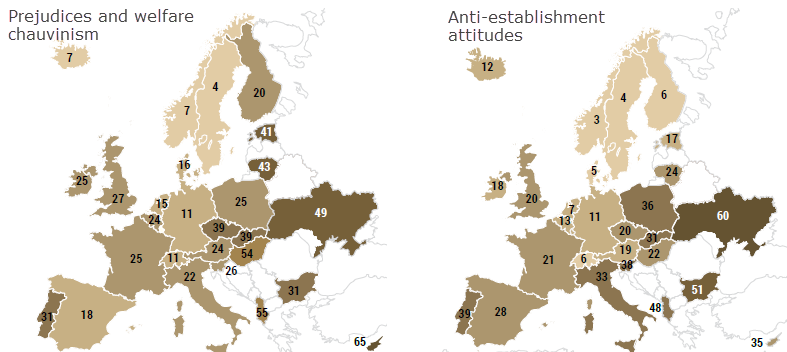Demand for Right-Wing Extremism Index (DEREX)
Political Capital created its Demand for Right-Wing Extremism Index (DEREX) based on the databases of the European Social Survey (ESS) in 2010, which has been used and quoted by numerous domestic and foreign researchers since then. DEREX is a value given in percentage points: it indicates the ratio of respondents who could be receptive to far-right ideologies and values and political actions connected to those in a given society based on their attitude and value patterns. The index facilitates the comparison of the share of attitude-radicals across European countries. The index is based on European Social Survey databases, and it forecast that the share of voters open to far-right ideologies would increase in several countries. In addition, the index helps distinguishing between different patterns of demand for far-right ideologies across European regions, which means that the extents of social and political risks associated with it are also divergent. In our studies about DEREX we discuss how the share of attitude-radicals have changed over the whole range of ESS surveys, what differences and similarities there are between the societies of European countries, and we shed light on the connections between the demand and supply sides of the issue.
Political Capital created an independent DEREX website for professionals, derexindex.eu, which helps researchers, university students, journalists and experts interested in the topic by providing them with databases, a graph creator and analyses. Recommendations for the index on the website were written by the leading European researchers of this topic (Jamie Bartlett, the extremism expert of the British Demos; Cas Mudde, professor at the University of Georgia; János Kis, professor at CEU).
The results of our most recent study published in 2016 indicates a clear increase in xenophobic and anti-EU sentiments in the majority of European countries.

- At the time of the data collection the effects of the refugee crisis had already been perceivable in most countries, thus it is unsurprising that DEREX’s prejudice and welfare chauvinism sub-index showed the most significant change. The share of respondent with extremely exclusionary attitudes increased the most in three “Visegrád” countries (Slovakia did not participate in the latest ESS survey, and no data is available for the two countries most affected by the refugee crisis, Italy and Greece, either). This value increased from 45 to 54% in Hungary, from 32 to 39 in the Czech Republic, and from 18 to 25 in Poland. The underlying reason for this increase is strengthening anti-immigration opinions almost everywhere, while anti-LGBTQ feelings declined in almost all countries examined. Among nations participating in the latest ESS survey, the weight of extreme anti-immigration opinions is over 30% in Hungary (54), Lithuania (43), Estonia (41), the Czech Republic (39) and Portugal (31).
- In Hungary, the effects of the refugee crisis and governmental campaigns built on that are extremely visible. This resulted in the prejudice and welfare chauvinism sub-index to reach a record-high level after a six-year-long gradual decrease. The only underlying cause is the strengthening of far-right attitudes regarding immigration, since the extent of homophobia – which is also included in the sub-index – reduced in Hungary as well. 45% of respondents would not allow any single person from poorer countries outside of Europe to settle in Hungary, which is a 10 percentage point increase compared to the value in 2012-2013. The extreme xenophobia is not significantly influenced by party preferences, Jobbik supporters are somewhat more intolerant in this regard, but even among the voters of the left-wing opposition the share of respondent with extreme anti-immigration attitudes is over 50%.
- One of the main conclusions of the systematically conducted surveys following the democratic transition is that Hungarians are highly intolerant and it seems like anti-immigration opinions reached a record-high level due to the effects of the refugee crisis and xenophobia essentially becoming governmental policy. This is confirmed by Tárki’s 2016 survey as well; the research institute had never before measured such a high value for xenophobia in Hungary. This is related to the high number of people who feel they are socially endangered, as Hungarians are typically intolerant of groups who they believe to be a threat to them. The responsibility of politics and, especially, the government is considerable for heightening feelings of social endangerment. It is unquestionable that constant anti-immigrant campaigns have brought significant gains to Fidesz since early 2015. Nevertheless, the social cost of anti-immigrant hysteria generated to achieve this is inestimable.
Our article about the most recent DEREX data published in the weekly HVG magazine can be downloaded here, in Hungarian. (pdf, 1,214 kB)
Our scientific publications:
- A szélsőjobboldal iránti társadalmi kereslet változása Magyarországon, 2014. [Changes in the demand for the far-right in Hungary, 2014]. The complete study is available in the online journal of the Sociological Department of the Social Sciences Research Center of MTA.
- Szélsőjobboldaliság Európában és Magyarországon, 2014. [Belonging to the far-right in Europe and Hungary, 2014]. In our study published in Társadalmi Riport 2014 we compare the shares and main characteristics of attitude-radicals across certain European countries, which are then categorized based on these traits. The complete study can be downloaded from Tárki’s website.
- A szélsőjobboldal iránti társadalmi kereslet növekedése Magyarországon, 2011. [The increasing demand for the far-right in Hungarian society]. Our article published in Politikatudományi Szemle 2011/2. [Political Science Review] can be accessed here.

